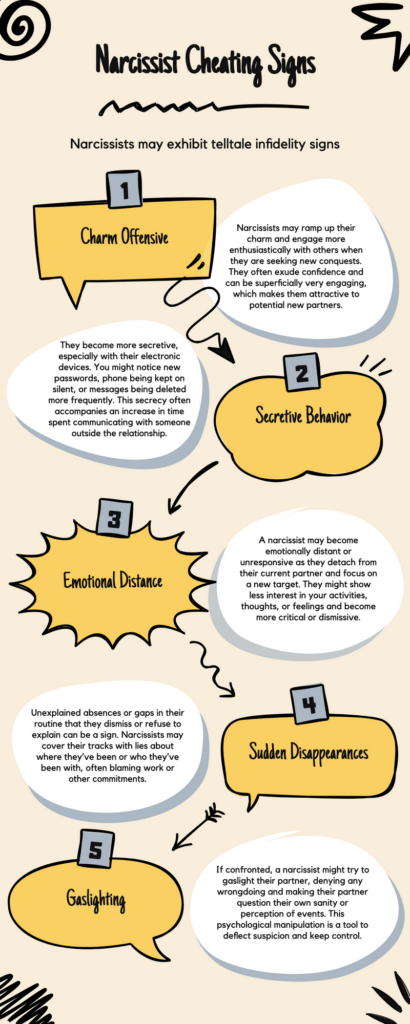Narcissistic Cheating Patterns
Confronting a Narcissist on Cheating Tactics
Tread carefully through the tangled web of confronting a narcissist about cheating, uncovering strategies that offer hope amidst betrayal.

Confronting a narcissist about their infidelity is like trying to find your way through a dark forest with only a faint lantern for light. The deception and manipulation make every step forward a precarious one.
However, as we navigate this treacherous terrain, we must remember that our journey towards seeking truth and reclaiming our dignity is a path worth treading.
The strategies and insights we are about to unveil can shed light on this complex process, offering a beacon of hope in the face of betrayal.
Key Takeaways
- Gather evidence and seek support before confronting a narcissistic partner
- Understand narcissistic cheating behaviors and challenges in confrontation
- Focus on effective communication and setting clear boundaries
- Seek professional help and prioritize mental health and safety
Safety Measures Before Confrontation
Before confronting a narcissist about cheating, it’s crucial to prioritize your safety by taking necessary precautions. When dealing with a partner who may have cheated and displays narcissistic traits, it’s essential to approach the situation with care. Confronting a cheating narcissist can evoke strong emotions, and having a plan in place can help you navigate the conversation more effectively.
Firstly, it’s important to gather evidence of the cheating before confronting the narcissistic partner. This evidence can help support your claims and provide clarity during the conversation. Additionally, reaching out to a trusted friend or therapist for support can help you process your emotions and feel more grounded before the confrontation.
When preparing to confront a cheating narcissist, it’s crucial to prioritize your safety. This may involve meeting in a public place, informing someone you trust about the conversation, or even seeking professional help if you feel unsafe. Remember, it’s important to remain calm and composed during the confrontation to ensure a more productive discussion.
Understanding Narcissistic Cheating Behaviors
Understanding Narcissistic Cheating Behaviors involves recognizing how individuals with narcissistic traits prioritize their own needs and desires above those of their partners, often leading to engagement in infidelity.
Narcissists, driven by a sense of entitlement and a constant need for validation, may cheat on their partners without remorse. Traits associated with narcissistic personality disorder, such as lack of empathy and manipulation tactics, play a significant role in their infidelity.
Confronting a narcissist about cheating can be challenging due to their tendency to deflect blame and gaslight their partners. It’s crucial to approach the situation with clear communication, setting boundaries, and being prepared for defensive responses.
Prioritizing mental health and seeking professional support are essential when confronting a partner suspected of cheating, especially when dealing with a narcissist who may struggle to admit to their infidelity.
Gathering Evidence and Planning
Navigating the complexities of confronting a narcissist about cheating involves a strategic approach that includes gathering evidence and planning for the difficult conversation ahead. When dealing with a narcissist who may be cheating, it’s essential to be prepared and have concrete evidence to support your claims. Here are some key points to consider:
- Seek support from trusted individuals: Before confronting the narcissist, confide in close friends or family members who can provide emotional support and guidance throughout the process.
- Look for signs of infidelity: Pay attention to red flags such as secretive behavior, unexplained absences, or a sudden change in their routine that may indicate they’re cheating.
- Gather concrete evidence: Document any suspicious activities, keep records of questionable messages or interactions, and gather any other evidence of their infidelity to strengthen your case when confronting them.
Effective Communication Strategies

To foster a constructive dialogue when confronting a narcissist about cheating, carefully selecting your words is crucial for effective communication. When addressing the issue, it’s essential to maintain a calm and non-confrontational tone to prevent triggering defensiveness or anger. Express the importance of honesty, trust, and understanding to create a conducive environment for discussion.
Stay focused on the behavior and its impact on the relationship, rather than engaging in blame or deflection tactics. Setting clear boundaries when confronting the narcissist can help manage manipulation tactics and maintain a healthy dialogue. If needed, seek professional help to navigate through the complexities of the situation.
Understanding the reasons behind the cheating and working together towards a resolution can pave the way for rebuilding trust and moving forward in a healthier relationship. Educating oneself on effective communication strategies in dealing with a cheating narcissist can also provide valuable insights for managing such challenging conversations.
Setting Boundaries and Seeking Support
Establishing clear boundaries with a narcissist is crucial for safeguarding emotional and physical well-being in challenging situations. When confronting a narcissist about cheating, it’s essential to prioritize your own mental health and safety.
Seeking support from trusted individuals can provide guidance and validation throughout this difficult process. Here are some key points to consider:
- Set Clear Boundaries: Clearly communicate your expectations and limits to the narcissistic individual to protect yourself from further emotional harm.
- Seek Professional Help: Reach out to a therapist or counselor who specializes in narcissistic relationships to regain control of your emotions and decisions.
- Join Support Networks: Consider connecting with support groups or online communities where you can share your experiences, gain insights, and receive additional support from others who’ve faced similar challenges.
Frequently Asked Questions
How Do Narcissists Act When Caught Cheating?
When caught cheating, narcissists often react defensively and aggressively. Expect blame-shifting, denial, or manipulation as typical responses. They may feign ignorance or deny their actions altogether.
Be prepared for verbal, emotional, mental, and financial attacks. Narcissists tend to portray themselves as victims to justify their behavior.
It’s essential to approach such situations with caution and seek support from trusted individuals.
How Do You Get a Narcissist to Admit Cheating?
We find that getting a narcissist to admit cheating can be extremely challenging. The individual’s tendency to deflect blame and manipulate situations often makes them avoid taking responsibility for their actions.
It’s crucial to approach this delicate situation with caution and prioritize your emotional well-being. Seeking support from a therapist or trusted confidant can provide guidance on navigating this complex dynamic.
Remember to focus on your healing and safety throughout this process.
Should You Confront Narcissist About Cheating?
We believe confronting a narcissist about cheating can be a challenging decision. It’s vital to assess safety risks and consider your motivations for seeking closure.
Remember, the narcissist likely knows about their infidelity. Prepare for potential negative outcomes and focus on your well-being during this process.
Prioritize your healing above all else.
What Words Can Destroy a Narcissist?
What words can truly unsettle a narcissist? Power dynamics may shift with precise, calculated language. Understanding their vulnerabilities and using them strategically could provoke a reaction.
However, it’s crucial to tread carefully, as this approach can lead to conflict. Is it worth the potential fallout? We should weigh the risks and benefits before choosing our verbal arsenal.
Conclusion
In conclusion, confronting a narcissist about cheating requires careful planning, evidence gathering, and effective communication.
Remember to prioritize your safety, set boundaries, and seek support throughout the process.
By understanding the behaviors of narcissists and standing up for yourself, you can start the journey towards healing and rebuilding your self-esteem.
Remember, you deserve a healthy and faithful relationship, free from manipulation and deceit.
Our Content Strategist, Jordan, has a knack for deciphering the digital landscape to determine what our audience seeks. With a foundation in behavioral science and digital marketing, Jordan crafts our content strategy, ensuring that our topics are relevant, research-based, and resonant. Their strategic approach helps Narcissistic Man reach hearts and minds across the globe.
Narcissistic Cheating Patterns
Will Narcissists Confess to Cheating? Find Out!

Were you aware that almost 40% of partnerships go through infidelity at some stage? Infidelity represents a profoundly troubling and difficult challenge, capable of destabilizing the very core of any partnership. In the context of narcissists, their actions and way of thinking can further exacerbate the complexity of the issue.
Being in a relationship with a narcissist can be a rollercoaster ride, characterized by a constant need for attention, a sense of entitlement, and a lack of empathy. But when it comes to cheating, do narcissists ever admit to their transgressions?
In this article, we delve into the intricate world of narcissism and infidelity, exploring why narcissists cheat, the signs of a cheating narcissist, and their tendency to avoid confession. We also provide insights into how to deal with a cheating narcissistic partner, whether narcissists can change after cheating, and the journey of recovering from a relationship with a cheating narcissist.
If you have ever wondered whether a narcissist will confess to cheating, join us as we unravel the complex dynamics of narcissism and infidelity.
Key Takeaways:
- Narcissists often cheat due to their sense of entitlement and need for constant admiration.
- Narcissistic individuals seldom feel remorse or confess to their infidelity due to their belief in being above the rules of fidelity.
- Signs of a cheating narcissist include secretive behavior, sudden changes in appearance, and projecting their infidelity onto their partner.
- Narcissists typically engage in gaslighting and manipulation to avoid taking responsibility for their actions and maintain their self-image as perfect.
- Dealing with a cheating narcissistic partner requires self-care, setting boundaries, and seeking support from trusted individuals.
Understanding Narcissism and Infidelity
Narcissistic individuals possess certain traits that can contribute to infidelity in relationships. They have a constant need for attention and admiration, often feeling entitled and superior to others. This need for validation and excitement can lead them to seek satisfaction outside of their primary partnership. In their pursuit of ego-boosting experiences, narcissists may project their own infidelity onto their partners, exhibiting controlling and manipulative behaviors.
These individuals lack remorse for their actions and view cheating as a means to feed their ego. They believe they are entitled to engage in extramarital affairs without considering the emotional consequences for their partners. Understanding the connection between narcissism and infidelity is crucial in recognizing the signs and patterns of narcissistic cheating.
“The need for constant attention and admiration often drives narcissists to seek validation and excitement outside of their primary relationship.”
Signs of Narcissistic Cheating
Identifying signs of narcissistic cheating in a relationship is essential for protecting oneself. Some common signs include:
- Sudden changes in behavior and appearance
- Frequent disappearances and being vague about their whereabouts
- Being overly secretive with their phone and guarding it closely
- Accusing their partner of cheating as a defense mechanism
- Flirting with others on social media
- Changes in libido
- Frequent plan cancellations
These signs can help individuals recognize potential infidelity in a narcissistic partner.
Understanding the behavioral patterns and tendencies of narcissistic individuals is key to navigating relationships affected by infidelity. Stay tuned for our next section, where we will explore why narcissists rarely admit to their cheating ways.
Signs of a Cheating Narcissist
When it comes to dealing with a narcissistic partner, identifying the signs of cheating can be crucial for maintaining emotional well-being and making informed decisions. Here are some common signs that may indicate a narcissist is being unfaithful:
- Frequent disappearances and vagueness about their whereabouts: A cheating narcissist may often disappear without giving a clear explanation of their whereabouts, making it difficult to trust their actions.
- Flirting on social media: Narcissists thrive on attention and validation, so they may engage in flirtatious behavior with others on social media platforms.
- Guarding their phone and being secretive with it: A cheating narcissist will often go to great lengths to protect their phone, including keeping it password-protected and not allowing their partner to access it.
- Accusing their partner of cheating as a defense mechanism: To divert attention and avoid suspicion, narcissists may project their own infidelity onto their partner, accusing them of cheating without any basis.
- Sudden changes in behavior and appearance: If a narcissist starts exhibiting drastic changes in behavior and appearance, such as dressing differently or adopting new habits, it could be a sign of cheating.
- Changes in libido: A cheating narcissist may experience fluctuations in their sexual desire and be less interested in intimate activities with their partner.
- Frequent plan cancellations: If a narcissist repeatedly cancels plans with their partner or avoids spending time together, it may indicate that they are prioritizing their affairs over the relationship.
- Avoidance of conversations about their behavior: When confronted about their suspicious actions, a cheating narcissist may deflect and avoid engaging in meaningful conversations about their behavior.
- Showering their partner with gifts out of the blue: To alleviate guilt or maintain control, a cheating narcissist may suddenly start showering their partner with gifts or extravagant gestures.
- Mysteriously spending more money: If a narcissist’s financial habits change and they start spending money excessively without a valid explanation, it could be a sign of cheating.
- Gaslighting their partner: Narcissists often employ gaslighting techniques to manipulate and confuse their partners, making them question their sanity and doubt their suspicions of infidelity.
- Seeking external validation: Cheating narcissists continuously seek validation and admiration from others to boost their ego and fulfill their need for attention.
- Excessive flirting with others: A narcissistic cheater may engage in excessive flirting with others, displaying inappropriate behavior and disregarding the boundaries of their committed relationship.
- Unexplained expenses: If a narcissist’s spending habits change and they frequently have unexplained expenses, it could be a sign of them financially supporting their extramarital affairs.
Recognizing these signs can empower individuals to address infidelity within a narcissistic relationship and make informed choices about their own well-being.
Why Narcissists Don’t Admit to Cheating
Narcissists exhibit a consistent pattern of denying their infidelity and refusing to admit their mistakes. This behavior stems from their narcissistic personality traits, including a lack of guilt and remorse for their actions. Instead of taking responsibility, they engage in manipulative tactics such as gaslighting to avoid facing the consequences of their cheating.
Narcissistic Gaslighting Cheating: Gaslighting is a common tactic employed by narcissists to manipulate their partner’s perception and reality. They distort the truth, make their partner doubt their memory, and question their sanity. By rewriting history and making their partner doubt their own experiences, narcissists are able to deflect blame and avoid admitting to their cheating behavior.
Lack of Guilt and Remorse: One key characteristic of narcissists is their inability to feel guilt or remorse for their actions. They view themselves as superior beings who are entitled to break relationship rules without consequence. Their lack of empathy and emotional detachment shields them from feeling any remorse for the pain they inflict on their partner.
Projection of Guilt: Instead of acknowledging their own guilt, narcissists project their feelings onto their partner. They accuse their partner of cheating or being unfaithful as a means of deflecting attention away from their own infidelity. By shifting the blame onto their partner, they further protect their self-image as flawless and untouchable.
Denial as a Defense Mechanism: Denial is a common defense mechanism used by narcissists to shield themselves from accountability. They refuse to acknowledge their cheating because it compromises their idealized self-image. Through denial, they can maintain the illusion of perfection and avoid confronting the consequences of their actions.
“Gaslighting, lack of guilt, projection, and denial are all tools narcissists use to protect their self-image and avoid admitting to their cheating.”
To fully grasp why narcissists don’t admit to cheating, it is important to understand the intricacies of their behavior. By denying, gaslighting, and projecting guilt, narcissists can uphold their sense of superiority and evade taking responsibility for their actions. This pattern makes it challenging for their partners to hold them accountable and seek closure.

Despite the manipulative tactics employed by narcissists, recognizing their patterns of behavior is crucial in order to protect oneself from further harm. It is important to seek support, set boundaries, and prioritize self-care when dealing with a narcissistic partner who refuses to admit their infidelity.
Dealing with a Cheating Narcissistic Partner
Recovering from a narcissist’s infidelity is a challenging journey that requires prioritizing self-care and seeking support from trusted friends, family, or professionals. When confronting a narcissistic partner about their cheating, careful planning and setting clear boundaries are essential. It is crucial to approach the conversation with calmness and assertiveness, avoiding becoming overly emotional or defensive.
Confronting a narcissist about their infidelity:
- Choose the right time and place: Find a neutral and comfortable setting to have an open and honest conversation.
- Be prepared: Gather evidence and facts to support your concerns, ensuring that you have a clear understanding of the situation.
- Stay calm and assertive: Maintain composure and express your feelings and concerns in a clear and confident manner.
- Set boundaries: Clearly communicate your expectations and boundaries moving forward.
- Seek therapy or counseling: Professional guidance can provide valuable insights and support in navigating the aftermath of infidelity in a narcissistic relationship.
Recovering from a narcissist’s infidelity:
- Focus on self-care: Prioritize your emotional and physical well-being by engaging in activities that bring you joy and relaxation.
- Seek support: Lean on trusted friends, family, or support groups who can offer guidance, empathy, and understanding.
- Practice forgiveness: Forgiving doesn’t mean forgetting, but it allows you to release the negative emotions and move forward with your life.
- Set boundaries: Establish clear boundaries to protect yourself from further harm and manipulation.
- Consider professional help: Therapy or counseling can help you process the emotions associated with the betrayal and provide you with tools to heal and rebuild.
“Recovering from a narcissist’s infidelity requires strength and resilience. Remember, you deserve happiness and a healthy relationship built on trust and respect.”
Dealing with a cheating narcissistic partner is challenging, but with the right support and self-care, you can navigate the complexities of the relationship. It is crucial to recognize your worth and consider the possibility of ending the relationship if the narcissistic behavior continues.

| Resources | Description |
|---|---|
| Therapy/Counseling | Seek professional guidance and support to navigate the aftermath of infidelity in a narcissistic relationship. |
| Support Groups | Join online or in-person support groups where you can connect with others who have experienced similar situations. |
| Self-Care Activities | Engage in activities that promote self-care, such as meditation, exercise, and hobbies that bring you joy. |
| Books | Read books on narcissism, infidelity recovery, and healthy relationships for further insight and guidance. |
Can a Narcissist Change After Cheating?
While it is possible for a narcissist to change their behavior after cheating, it is unlikely. Narcissists have a deep-seated sense of entitlement and a lack of empathy, which make it difficult for them to take responsibility for their actions. Changing narcissistic behavior requires intensive therapy and a genuine desire for change, which most narcissists lack. It is important to consider the likelihood of a narcissist changing before deciding whether to continue the relationship.
When it comes to staying faithful, narcissists struggle due to their constant need for validation and admiration. This need often leads them to seek attention and excitement outside of their primary partnership. Their lack of guilt and remorse for their actions allows them to easily engage in infidelity without considering the consequences on their partner.
Narcissists have a tendency to deny and deflect responsibility for their cheating. They often manipulate their partner’s perception of reality through gaslighting, shifting blame, and projecting their own guilt onto their partner. This denial and refusal to take responsibility for their actions make it challenging for a narcissist to change their cheating ways.
Changing narcissistic behavior requires intensive therapy that addresses underlying issues such as low self-esteem, lack of empathy, and entitlement. However, most narcissists are resistant to therapy and lack the genuine desire for self-improvement necessary for meaningful change.
When considering whether a narcissist can take responsibility for their actions, it is important to understand that their inherent traits and tendencies make it difficult for them to acknowledge and accept their wrongdoing. Taking responsibility requires empathy, self-reflection, and the ability to recognize the pain they have caused their partner. Unfortunately, these qualities are often lacking in narcissistic individuals.
Ultimately, the decision to continue a relationship with a cheating narcissist rests on a careful assessment of the likelihood of change and personal boundaries. It is important to prioritize one’s own well-being and remember that change can be challenging, especially for narcissistic individuals with deeply ingrained patterns of behavior.

| Factors | Likelihood of Change |
|---|---|
| Genuine desire for change | Low |
| Willingness to take responsibility | Low |
| Capacity for empathy | Low |
| Resistance to therapy | High |
It’s important to note that not all narcissists cheat, and infidelity is not exclusive to narcissistic individuals. Each person and relationship is unique, and individual circumstances may vary.
Recovering from a Relationship with a Cheating Narcissist
Recovering from a relationship with a cheating narcissist can be a challenging and lengthy journey. It requires a focus on self-care and seeking support from trusted individuals who understand the complexities of such experiences. Therapy or counseling can play a crucial role in processing the intense emotions and trauma associated with the relationship. By gaining a deeper understanding of narcissistic personality disorder and the dynamics of infidelity, individuals can begin to heal and rebuild their lives after the devastating betrayal.
Setting boundaries is essential in the recovery process, allowing individuals to regain a sense of control and rebuild their self-esteem. Self-love and self-compassion are also vital aspects of the healing journey, enabling individuals to nurture their emotional well-being and rebuild trust in themselves and others.
Support Networks and Professional Help
It is important to seek support from trusted friends, family, or support groups who can provide a safe space for healing and processing emotions. Connecting with others who have experienced similar situations can provide validation and reassurance during the recovery process.
Professional help, such as therapy or counseling, is highly recommended for individuals recovering from a relationship with a cheating narcissist. A qualified therapist can provide guidance and support in navigating the emotional challenges, helping individuals understand the impact of the narcissistic behavior and regain a sense of self.
Self-Care and Emotional Healing
Self-care practices are crucial for recovering from a relationship with a cheating narcissist. Engaging in activities that promote self-nurturing and self-discovery can aid in rebuilding self-esteem and finding personal fulfillment. This may include practicing mindfulness, engaging in creative outlets, pursuing hobbies, or engaging in physical activities.
“Recovery from a relationship with a cheating narcissist is a process of rediscovering our worth and healing our emotional wounds.”
Understanding the dynamics of narcissistic personality disorder and how it relates to infidelity can be empowering and aid in the healing process. Educating oneself about the manipulative tactics employed by narcissists can help individuals recognize and overcome the emotional turmoil caused by the betrayal.
Rebuilding Trust and Moving Forward
Rebuilding trust after a relationship with a cheating narcissist can be challenging, but it is possible with time, self-reflection, and professional support. It is important to remember that trust is earned, and individuals must prioritize their own well-being and safety.
Steps in Recovering from a Relationship with a Cheating Narcissist 1. Seek professional help 2. Establish boundaries 3. Engage in self-care and emotional healing practices 4. Educate oneself about narcissistic behavior 5. Rebuild trust gradually
Moving forward, it is essential to focus on personal growth and surround oneself with positive and supportive individuals. As recovery progresses, individuals can regain their confidence, set healthy boundaries, and establish fulfilling relationships built on trust and mutual respect.

Can Narcissists Feel Guilt or Remorse for Cheating?
Narcissists typically do not feel guilt or remorse for cheating. They lack empathy and have a limited capacity for understanding the impact of their actions on others. Narcissists see cheating as a means of gratifying their own needs and ego, without considering the emotional consequences for their partner.
“The narcissist perceives themselves as superior and entitled, prioritizing their own desires above all else. They believe that they deserve whatever they want, including engaging in infidelity.”
Their lack of guilt and remorse allows them to continue engaging in infidelity without the desire or motivation for change. This lack of empathy is a defining trait of narcissistic personality disorder. It is important to understand this aspect of narcissistic behavior when considering the potential for reconciliation or rebuilding trust.

Conclusion
Recovering from a narcissist’s infidelity and dealing with a cheating narcissistic partner can be an emotionally challenging journey. It is crucial to understand the dynamics of narcissistic personality disorder and the patterns of narcissistic cheating in order to navigate the aftermath of infidelity effectively. By prioritizing self-care, seeking support, and setting clear boundaries, we can begin the process of healing and rebuilding our lives.
It is important to carefully consider the individual’s behavior and willingness to change before deciding the future of the relationship. While it is possible for a narcissist to change, it is unlikely due to their deep-seated sense of entitlement and lack of empathy. Therapy or counseling can be beneficial in processing the emotions and trauma associated with the relationship, as well as providing guidance on how to move forward.
Ultimately, we must prioritize our own well-being and make choices that align with our personal values and needs. By understanding the complexities of recovering from a narcissist’s infidelity and navigating a relationship with a cheating narcissistic partner, we can empower ourselves to find healing, growth, and happiness.
Narcissists are unlikely to admit to cheating due to their lack of guilt and remorse. They often engage in gaslighting and deny their actions to avoid taking responsibility. Signs of a cheating narcissist include frequent disappearances, being secretive with their phone, accusing their partner of cheating, changes in behavior and appearance, excessive flirting, and unexplained expenses.
Narcissists don’t admit to cheating because they lack guilt and often engage in gaslighting to deflect blame and maintain their self-image as perfect. They project their guilt onto their partner.
Confronting a narcissist about cheating requires careful planning, clear boundaries, and calm assertiveness. Seeking therapy or counseling can be helpful in navigating the aftermath of infidelity.
While it is possible for a narcissist to change after cheating, it is unlikely. Changing narcissistic behavior requires intensive therapy and a genuine desire for change.
Recovering from a relationship with a cheating narcissist requires self-care, support from trusted individuals, and therapy or counseling to process emotions and rebuild one’s life. Narcissists typically do not feel guilt or remorse for cheating. Their lack of empathy and limited capacity for understanding the impact of their actions prevent them from feeling remorse.
FAQ
Will a narcissist ever admit to cheating?
What are the signs of a cheating narcissist?
Why don’t narcissists admit to cheating?
How can I confront a narcissist about their cheating?
Can a narcissist change their cheating ways?
How can I recover from a relationship with a cheating narcissist?
Do narcissists feel guilt or remorse for cheating?
As our Lead Writer, Mia has a talent for turning complex ideas into compelling narratives. With a rich background in writing and a deep passion for psychology, Mia’s articles provide insightful, accessible explorations of narcissistic behavior and its impact on individuals and relationships. Mia’s contributions are thought-provoking and offer practical advice for our readers.
Narcissistic Cheating Patterns
Confronting Cheating on a Narcissist – Reddit Insights

Were you aware that 94% of relationships involving narcissists face infidelity? The profound effects of unfaithfulness on a person in a relationship with a narcissist can cause them to doubt their own value and find it challenging to restore trust. In this piece, we explore the realm of Reddit, where genuine people recount their own stories and offer important advice on managing infidelity in relationships with narcissists.
Key Takeaways:
- Infidelity is a common occurrence in narcissistic relationships, affecting the majority of these partnerships.
- Cheating on a narcissist can have profound effects on the victim’s self-esteem and ability to trust.
- Reddit provides a supportive community where individuals can share their experiences and gain valuable insights on coping with infidelity in narcissistic relationships.
- Recognizing the signs of a narcissistic partner is crucial for understanding the dynamics of cheating in these relationships.
- Professional help, such as therapy and support groups, plays a significant role in healing and recovery from narcissistic infidelity.
Understanding the Dynamics of Narcissistic Abuse
Survivors of narcissistic abuse often find themselves grappling with the devastating aftermath of infidelity. In narcissistic relationships, the manipulative tactics and gaslighting employed by the narcissist can leave the victim feeling utterly worthless and emotionally disconnected. The pain inflicted by their partner’s betrayal is compounded by the realization that they have been subjected to a pattern of psychological and emotional abuse.
On Reddit, a platform where individuals can share their personal experiences, users open up about the challenges they face in healing from cheating in a narcissistic relationship. These survivor stories shed light on the dynamics of narcissistic abuse and offer invaluable support and guidance to those who are struggling to navigate the aftermath of infidelity.
Taking solace in the understanding and empathy of others who have experienced similar traumas, reddit users provide a safe haven for individuals seeking narcissistic abuse support. Through heartfelt conversations and shared insights, they offer advice to those trying to survive infidelity with a narcissist. Together, they explore strategies for confronting the emotional turmoil, rebuilding shattered self-esteem, and finding their way towards a healthier future.
“I remember feeling so isolated and helpless after discovering my partner’s infidelity. But connecting with fellow survivors on Reddit allowed me to realize that I wasn’t alone in this painful journey. The support and understanding I received were instrumental in my healing process.” – Reddit User
Tips for Surviving Cheating with a Narcissist
- 1. Prioritize self-care: Focus on nurturing yourself emotionally, mentally, and physically. Engage in activities that bring you joy and help rebuild your sense of self-worth.
- 2. Seek support: Reach out to support groups or therapy to receive guidance from professionals or fellow survivors who understand the unique challenges of narcissistic abuse.
- 3. Set boundaries: Establish clear boundaries to protect yourself from further harm. Communicate your needs and expectations with your partner, and enforce consequences for violating them.
- 4. Educate yourself: Learn about narcissistic personality disorder and the tactics commonly employed by narcissists. Equipping yourself with knowledge will help you better understand and navigate the dynamics of the relationship.
- 5. Consider professional help: If the trauma of infidelity and narcissistic abuse becomes overwhelming, seeking professional therapy can provide you with the tools to heal and move forward.
| Effects of Narcissistic Abuse | Survival Strategies |
|---|---|
| Loss of self-esteem and self-worth | Engaging in self-care activities to rebuild confidence and sense of self |
| Emotional manipulation and gaslighting | Seeking validation from a support group to counteract manipulation and regain clarity |
| Isolation and feeling trapped | Connecting with others who have experienced similar abuse for emotional support and guidance |
| Difficulty trusting in future relationships | Working with a therapist to address trust issues and develop healthy relationship patterns |
By understanding the complexities of narcissistic abuse, survivors can gain the knowledge and support necessary for their healing journey. Reddit offers a community where individuals can find solace, share their stories, and empower each other to survive and thrive beyond the trauma of infidelity in narcissistic relationships.
Signs of a Narcissistic Partner
When it comes to dealing with a narcissistic partner, recognizing the signs is the first step towards understanding the dynamics of infidelity in a narcissistic relationship. Reddit users have shared their insights, shedding light on the red flags and behaviors exhibited by narcissistic partners. These behaviors can help explain the reasons behind their infidelity and the profound impact it has on the victim’s self-worth.
Here are some common signs of a narcissistic partner:
- Self-centeredness: Narcissistic partners often prioritize their own needs and desires over their partners’. They may lack empathy and show little interest in their partner’s feelings or experiences.
- Constant need for admiration: Narcissists crave attention and validation from others. They seek constant admiration and may become discontented if they don’t receive it.
- Manipulation and gaslighting: Narcissistic partners are skilled manipulators, using tactics like gaslighting to distort their partners’ perception of reality. They may dismiss their partner’s concerns or make them question their own sanity.
- Lack of accountability: Narcissists often refuse to take responsibility for their actions, shifting blame onto others. When confronted with evidence of their infidelity, they may deny or minimize their actions.
- Grandiose sense of self-importance: Narcissistic partners may have an inflated sense of their own importance and believe they are superior to others. They may belittle their partners, disregarding their opinions and achievements.
- Charm and charisma: Narcissists can be charming and charismatic, making it easy for them to attract and manipulate others. This charm can be used to deceive and maintain control over their partners.
Recognizing these signs can empower individuals to protect themselves and make informed decisions when faced with infidelity in a narcissistic relationship. Understanding the motivations and behaviors of narcissistic partners is essential in coming to terms with the effects of cheating and rebuilding one’s self-esteem.
“My narcissistic partner always made everything about them and insisted on being the center of attention. It took me a while to realize that their infidelity was just another way for them to feed their ego at my expense.” – Reddit user
Dealing with a Narcissistic Partner
Coping with a narcissistic partner can be challenging and emotionally draining. It is important to prioritize your own well-being and establish boundaries to protect yourself from further harm. Seeking support from trusted friends, family, or a therapist can also be beneficial. Remember, you deserve to be treated with respect and love.
Now, let’s delve deeper into confronting narcissistic cheating and exploring effective strategies for navigating the complexities of infidelity in a narcissistic relationship.

| Signs of a Narcissistic Partner | Impact on the Victim |
|---|---|
| Self-centeredness | Feelings of neglect and unimportance |
| Constant need for admiration | Insecurity and low self-esteem |
| Manipulation and gaslighting | Doubt and confusion |
| Lack of accountability | Diminished trust and connection |
| Grandiose sense of self-importance | Feelings of inadequacy and insignificance |
| Charm and charisma | Vulnerability to manipulation |
Confronting Narcissistic Cheating
When faced with a cheating narcissist, it’s crucial to approach the situation with careful planning and seek the necessary support to navigate the challenges ahead. Reddit users, who have experienced similar situations, provide valuable advice on how to confront a cheating narcissist.
“Confrontation is key, but always remember to prioritize your emotional well-being. Set boundaries and communicate your feelings clearly and assertively. It’s important to remain calm and collected during these conversations to avoid giving the narcissist additional power.”
Confronting a narcissistic cheater can be emotionally challenging, but drawing strength from community support can help provide solace and guidance. Reddit users share their personal experiences and offer validation to those facing the difficult task of confronting a cheating narcissist.
It’s important to remember that seeking professional help is also a viable option. A licensed therapist or counselor can help navigate the complexities of the situation and provide guidance on setting healthy boundaries and maintaining personal well-being.
Approaching the Confrontation:
- Plan ahead and gather evidence if necessary, helping to validate your concerns.
- Choose a neutral and safe environment for the conversation.
- Express your feelings and concerns using “I” statements to avoid unnecessary conflict.
- Remain calm and assertive, focusing on your personal boundaries and expectations.
- Consider bringing a trusted friend or family member for support.

Taking the steps to confront a cheating narcissist is a major decision. By seeking advice, setting boundaries, and finding support within the Reddit community, individuals can face the challenges head-on and begin the journey towards healing and personal growth.
Healing and Recovery from Narcissistic Infidelity
Recovering from infidelity in a narcissistic relationship is a challenging journey that requires resilience and inner strength. The betrayal experienced can leave deep emotional scars, but it is possible to heal and rebuild your life. In this section, we will explore the personal stories, tips, and strategies shared by Reddit users who have gone through this process. Their insights offer guidance for finding closure, rebuilding self-esteem, and moving forward after the painful betrayal of a narcissistic partner.
“The process of healing after cheating on a narcissist is unique and complex. It’s important to remember that you’re not alone in this journey.”
Discovering Closure
One of the initial steps towards healing after infidelity is finding closure. This involves acknowledging the reality of the betrayal and allowing yourself to process the pain and emotions associated with it. Reddit users emphasize the importance of accepting the truth and understanding that healing is a gradual process.
“Finding closure doesn’t happen overnight. It involves facing the pain head-on and allowing yourself to grieve the loss of trust and the idealized image you had of your partner.”
Rebuilding Self-Esteem
Being in a narcissistic relationship can profoundly damage your self-esteem and self-worth. However, it is possible to rebuild your confidence and regain a sense of worthiness. Reddit users suggest practicing self-care, surrounding yourself with positive influences, and seeking therapy or counseling to address the psychological impact of the narcissistic abuse.
“Rebuilding your self-esteem is a process, but it begins with self-compassion and treating yourself with kindness and respect. Remember that you are deserving of love and happiness.”
Moving Forward
After the healing process, it’s time to let go of the past and focus on building a brighter future. Reddit users advise setting new goals, pursuing personal passions, and surrounding yourself with a supportive network of friends and family.

Tips and Strategies from Reddit Users
To further support your healing and recovery, here are some additional tips and strategies shared by Reddit users:
- Join a support group for cheating on a narcissist to connect with others who have had similar experiences.
- Practice self-reflection and learn from the past to avoid repeating patterns in future relationships.
- Engage in activities that bring you joy and help you rediscover your passions.
- Focus on self-care, including physical exercise, mindfulness practices, and self-expression through creative outlets.
By implementing these strategies and seeking support from others who have walked a similar path, you can find the strength and resilience needed to heal and recover from the devastation of infidelity in a narcissistic relationship.
Tips for Healing and Recovery from Narcissistic Infidelity Find closure by acknowledging the betrayal and allowing yourself to grieve. Rebuild self-esteem through self-care, therapy, and surrounding yourself with positive influences. Move forward by setting new goals, pursuing passions, and building a supportive network.
Finding Community and Support on Reddit
When facing the complexities of infidelity in a narcissistic relationship, finding a supportive community can make all the difference. Reddit provides a safe space for individuals who have experienced cheating on a narcissist to share their stories, offer advice, and seek guidance from others who have been through similar experiences.

Within these online communities, you’ll find empathetic individuals who understand the unique challenges of infidelity in a narcissistic dynamic. They provide a place where you can express your emotions, ask questions, and receive support without judgment. From coping strategies to personal stories of resilience, you’ll discover a wealth of resources to help you navigate the healing process.
By connecting with others on Reddit, you’ll gain valuable insights into different coping mechanisms and learn from the experiences of those who have successfully healed from infidelity in narcissistic relationships. It’s a community that understands the pain, confusion, and emotional turmoil that comes with cheating on a narcissist.
Supportive Advice and Insights
Joining a Reddit support group for cheating on a narcissist has been a lifeline for me. I’ve found comfort in knowing that I’m not alone and that there are others who have experienced the same betrayal. The advice and insights shared by fellow Redditors have been invaluable in my healing journey.
– Reddit user
The support on Reddit goes beyond just words of encouragement. Users often share practical tips and strategies to help you regain your self-worth, set boundaries, and start the process of healing. It’s a community that believes in your ability to overcome the challenges of infidelity in a narcissistic relationship.
Whether you’re seeking validation, guidance, or a sense of belonging, finding a community on Reddit can provide a much-needed space for healing and growth. Remember, you don’t have to face the aftermath of cheating on a narcissist alone.
Recommended Subreddits
Here are some popular subreddits where you can find support for infidelity in a narcissistic relationship:
- /r/NarcissisticAbuse – A community dedicated to supporting victims of narcissistic abuse.
- /r/SurvivingInfidelity – A subreddit focused on helping individuals navigate infidelity in various relationship dynamics.
- /r/Relationships – A subreddit where you can seek advice and support for all types of relationship issues, including infidelity.
These subreddits are just a starting point, and there are many more out there. Explore different communities and find the one that resonates with you the most.
Benefits Advantages 1. Emotional Support Connect with individuals who understand your experiences and can provide empathy and understanding. 2. Validation Validate your feelings and experiences by hearing stories from others who have been through similar situations. 3. Practical Advice Learn coping strategies and practical tips from those who have successfully healed from infidelity in narcissistic relationships. 4. Sense of Belonging Find a supportive community where you can express yourself, ask questions, and build connections with others.
Remember, finding community and support on Reddit is just one aspect of your healing journey. Seek professional help, such as therapy or counseling, to supplement the support you receive online. Your path to healing and recovery from infidelity in a narcissistic relationship is unique to you, but knowing that you have a community of individuals who understand and support you can make a world of difference.
Coping Strategies for Dealing with a Cheating Narcissist
Dealing with a cheating narcissist can be emotionally draining. When facing the challenges of infidelity in a narcissistic relationship, it’s important to have effective coping strategies in place. Fortunately, Reddit users have shared valuable insights and tips on how to navigate this difficult situation while maintaining your mental and emotional well-being.
Practicing Self-Care
One key strategy recommended by Reddit users is to prioritize self-care. Taking care of yourself physically, mentally, and emotionally is crucial when dealing with the aftermath of cheating in a narcissistic relationship. Engage in activities that bring you joy, practice mindfulness or meditation, and make time for self-reflection.
“Prioritizing self-care helped me regain my strength and confidence. It’s important to remember that you deserve love and care, especially during this challenging time.”
Setting Boundaries
Setting clear boundaries is essential when dealing with a cheating narcissistic partner. Establishing and enforcing boundaries can help protect your emotional well-being and maintain your sense of self. Communicate your expectations and limits clearly, and remember that it’s okay to walk away if your boundaries are continuously violated.
“Setting boundaries was a game-changer for me. It helped me regain control and establish a healthier dynamic in my relationship.”
Seeking Therapy
Seeking therapy or counseling is highly recommended by Reddit users who have dealt with infidelity in narcissistic relationships. A therapist can provide professional guidance, support, and validation throughout the healing process. They can help you navigate the complex emotions and challenges that arise from being in a relationship with a cheating narcissist.
“Therapy was instrumental in my healing journey. It provided a safe space for me to process my emotions, gain insight, and develop coping mechanisms to deal with the infidelity.”
By implementing these coping strategies, you can better navigate the difficulties of being in a relationship with a cheating narcissist. Remember, taking care of yourself and seeking support are essential steps towards healing and finding happiness again.

Overcoming Shame and Guilt in a Narcissistic Affair
The shame and guilt experienced in a narcissistic affair can be overwhelming. Both the victim and the cheater are burdened with these powerful emotions, often leading to a cycle of self-blame and remorse. However, on Reddit, individuals bravely share their struggles and journeys of healing after cheating on a narcissistic partner. Their stories of resilience and personal growth provide hope and guidance for those who are facing similar feelings of shame and guilt.
One user, MeganS, candidly expressed, “When I discovered my partner’s infidelity, I was devastated and felt an immense amount of shame. I questioned my worthiness and wondered what I did wrong to drive them to cheat. But through therapy and self-reflection, I realized that the affair was not a reflection of my value as a person.”
“Our society often places the blame solely on the person who has been cheated on. But in a narcissistic relationship, it’s important to remember that the cheater’s actions are driven by their own insecurities and manipulative tendencies. The shame and guilt we carry should not define us or our healing journey.”
Reddit users like MeganS also emphasize the importance of finding closure after cheating on a narcissistic partner. This closure may come in the form of cutting ties with the cheater, seeking therapy, or engaging in self-care activities. It is a deeply personal process, and each individual must find their own path towards healing.
In their shared experiences, these brave individuals underline the significance of self-forgiveness and self-compassion. One user, MichaelD, describes his journey of healing after cheating on a narcissistic partner:
“I carried immense guilt for my actions, but I realized that forgiving myself was crucial for my own well-being. I learned to acknowledge my mistakes, take responsibility, and commit to personal growth. Healing is a gradual process, but I am now focused on building a better future for myself.”
Through empathy and support, Reddit users offer guidance for those seeking healing after cheating on a narcissistic partner. They remind us that shame and guilt do not define us, and finding closure is possible through self-forgiveness, therapy, and personal growth.

Quotes:
- “The shame and guilt we carry should not define us or our healing journey.” – MeganS
- “Healing is a gradual process, but I am now focused on building a better future for myself.” – MichaelD
Seeking Professional Help for Narcissistic Infidelity
When dealing with the complexities of narcissistic infidelity, seeking professional help can be crucial. Therapists and support groups provide invaluable guidance and support to help individuals heal from the trauma of cheating in a narcissistic relationship.
Reddit users emphasize the importance of reaching out to experts who specialize in narcissistic abuse and infidelity. These professionals possess the knowledge and experience necessary to navigate the unique challenges presented by narcissistic dynamics. They can offer personalized advice, techniques, and coping mechanisms specifically tailored to the complexities of narcissistic relationships.
For individuals seeking advice on cheating in a narcissistic dynamic, therapists can provide insights and strategies to navigate the complexities of the relationship. They can help individuals understand the underlying causes and patterns of narcissistic behavior, empowering them to make informed decisions regarding their well-being.
In addition to individual therapy, joining a narcissistic abuse support group can provide a safe and understanding environment. These support groups offer a sense of community, where individuals can find solace and validation among others who have experienced similar challenges. Sharing experiences, learning from others, and receiving guidance from trained moderators can be instrumental in the healing process.

Remember, seeking professional help is not a sign of weakness. It is a proactive step towards healing and reclaiming your self-worth. By reaching out to therapists and joining support groups, individuals can find the resources needed to navigate the overwhelming emotions and complexities of narcissistic infidelity.
Conclusion
Surviving a narcissistic relationship and healing after the trauma of infidelity require immense strength and resilience. Reddit provides a supportive community where survivors can share their stories, find solace, and gain valuable insights from others who have experienced similar challenges.
The platform allows for a unique understanding of the complexities and dynamics involved in cheating with a narcissist. By sharing their personal experiences, members of the Reddit community offer support and validation to those who have been victims of narcissistic infidelity.
Access to this online support group can be a crucial resource for individuals seeking guidance and strategies for navigating the healing process. From coping mechanisms to professional advice, Reddit offers a wealth of knowledge and compassionate support to help victims of narcissistic infidelity reclaim their lives and find healing and recovery.
Coping with infidelity in a narcissistic relationship can be incredibly challenging. It’s important to prioritize your own well-being by practicing self-care, setting boundaries, and seeking professional help if needed. Talking to a therapist or joining a support group can provide valuable guidance and validation.
Narcissistic partners often exhibit manipulative and self-centered behaviors. They may have an exaggerated sense of self-importance, lack empathy, engage in gaslighting, and constantly seek admiration. These traits can contribute to a toxic dynamic and make infidelity more likely.
Confronting a narcissistic cheater requires careful planning and support. It’s important to set clear boundaries and communicate your feelings assertively. Seeking professional help, such as therapy or counseling, can provide guidance and assistance in navigating this difficult conversation.
Healing from narcissistic infidelity is a journey that takes time and support. It’s important to focus on self-care, rebuild your self-esteem, and seek closure. Engaging in therapy or joining a support group can provide a safe space to process your emotions and learn coping strategies. Yes, Reddit offers a supportive community where individuals can share their experiences, seek advice from others who have been in similar situations, and find solace in knowing they are not alone. Joining a reddit support group can provide valuable insights and guidance during your healing process.
Coping with a cheating narcissistic partner requires implementing strategies such as practicing self-care, setting boundaries, and seeking therapy. It’s important to prioritize your mental and emotional well-being while navigating the challenges of being in a relationship with a narcissistic cheater.
Overcoming the shame and guilt in a narcissistic affair can be challenging, but it’s important to remember that the responsibility lies with the cheater, not the victim. Finding closure through therapy, support groups, and self-compassion can help in the healing process.
Seeking professional help, such as therapy, counseling, or joining a narcissistic abuse support group, can be instrumental in navigating the complexities of narcissistic infidelity. These resources can provide expert guidance, validation, and support throughout your healing journey.
Finding closure after cheating on a narcissist requires time and self-reflection. It’s important to focus on healing, setting boundaries, and rebuilding your life. Seeking support from a therapist, support group, or trusted friends can provide guidance and validation as you navigate this process. Reddit offers various support groups and communities for cheating victims, including those who have experienced infidelity in a narcissistic relationship. By joining these communities and sharing your story, you can receive support, advice, and empathy from others who have gone through similar experiences.
FAQ
How can I cope with infidelity in a narcissistic relationship?
What are the signs of a narcissistic partner?
How should I confront a narcissistic cheater?
How can I heal and recover from narcissistic infidelity?
Is there a community where I can find support for cheating on a narcissist?
What strategies can help me cope with a cheating narcissistic partner?
How can I overcome the shame and guilt in a narcissistic affair?
Should I seek professional help for narcissistic infidelity?
How can I find closure and move on from cheating on a narcissist?
Where can I find support for cheating victims on Reddit?
Source Links
- https://www.reddit.com/r/LifeAfterNarcissism/comments/16m75cu/my_husband_cheated_on_me_with_a_narcissist/
- https://www.reddit.com/r/NarcissisticAbuse/comments/180ifxr/i_finally_found_proof_that_my_nex_cheated_and_i/
- https://www.reddit.com/r/cheating_stories/comments/zuy110/thread_6_confronting_my_husband_while_hes_on/
As our Lead Writer, Mia has a talent for turning complex ideas into compelling narratives. With a rich background in writing and a deep passion for psychology, Mia’s articles provide insightful, accessible explorations of narcissistic behavior and its impact on individuals and relationships. Mia’s contributions are thought-provoking and offer practical advice for our readers.
Narcissistic Cheating Patterns
Narcissist Cheating on New Supply: The Signs
Beware of the unexpected twists and turns when a narcissist's attention shifts to a new target, leaving their current supply in turmoil.

Have you ever pondered whether it’s typical for a narcissist to cheat on their latest partner?
The dynamics of a narcissistic relationship can be complex and often shrouded in manipulation and deceit. However, what happens when the narcissist’s attention strays to someone new, leaving their current partner in a state of confusion and heartbreak?

In exploring the intricacies of a narcissist’s infidelity, one may uncover unsettling truths that shed light on the devastating impact of their actions.
Key Takeaways
- Devastating emotional turmoil and shattered trust caused by narcissist’s infidelity
- Red flags include secretive behavior, sudden changes, and idealizing the new supply
- Coping involves setting boundaries, self-care, and seeking professional help
- Healing requires self-reflection, acknowledging the impact, and prioritizing mental health.
The Impact of Narcissist’s Cheating
The devastating repercussions of a narcissist’s infidelity extend far beyond mere betrayal, plunging their victims into a whirlwind of emotional turmoil and shattered trust. When a narcissist cheats on their new supply, the impact is profound, leaving behind a trail of destruction in its wake. The relationship that was once built on love bombing and false promises now crumbles under the weight of deceit and manipulation.
As the narcissist starts parading their new relationship, flaunting it on social media and in public, the current partner is left reeling from the shock and disbelief of being replaced so callously. The emotional trauma inflicted by the narcissistic abuse runs deep, eroding the victim’s sense of self-worth and leaving them questioning their own reality.
The new supply, unaware of the narcissist’s true nature, becomes ensnared in a web of lies and deceit, experiencing the highs of idealization followed by the lows of devaluation. The cycle of infidelity continues, with the new supply eventually becoming the next victim in line.
It’s essential for those impacted by a narcissist’s cheating to prioritize their healing and seek professional help to navigate the aftermath of such emotional devastation.
Red Flags in Narcissistic Infidelity

Amidst the intricate web of narcissistic infidelity, subtle behavioral shifts often serve as potent red flags signaling impending betrayal. When navigating the treacherous waters of a narcissist cheating on their new supply, it’s crucial to be vigilant for these warning signs:
- Emotional Distance: The narcissist becomes distant and emotionally unavailable, withdrawing from the current partner to invest more in the new supply.
- Secretive Behavior: They start spending more time away from home and become secretive about their whereabouts, indicating potential clandestine meetings with the new partner.
- Change in Appearance or Behavior: A sudden change in appearance or behavior can signify the narcissist’s efforts to impress someone new, often at the expense of their current relationship.
- Defensive and Critical Attitude: The narcissist may become overly defensive, picking fights, and criticizing their current partner while idealizing the new supply, creating a sense of self-doubt and confusion in the current partner.
Coping With Narcissist’s Betrayal
Navigating the aftermath of a narcissist’s infidelity requires a resilient mindset and a strategic approach to coping with betrayal. When faced with a narcissist cheating on their new supply, it’s crucial to acknowledge the pain caused by their betrayal. Understanding that the narcissist’s actions stem from their own insecurities and constant need for validation can help in depersonalizing the situation.
Setting firm boundaries and prioritizing your emotional well-being is essential in distancing yourself from their toxic behavior.
To cope effectively, focus on healing and rebuilding self-esteem through self-care practices and surrounding yourself with positivity. Seeking professional help or therapy can aid in processing complex emotions and gaining insight into narcissistic behavior.
Understanding Narcissist’s Manipulative Behavior
Understanding the manipulative tactics of a narcissist is essential for identifying and navigating their deceptive behaviors effectively. When dealing with a narcissist who’s cheating on their new supply, it’s crucial to be aware of the following insights:
- Emotional Manipulation: Narcissists are adept at manipulating emotions to control their partners. They may use gaslighting, guilt-tripping, or playing the victim to maintain power in the relationship.
- Love Bombing: To lure in their new supply, narcissists often engage in intense affection and attention known as love bombing. This tactic can make the new partner feel special and desired, blinding them to the narcissist’s true intentions.
- Isolation: Narcissists may strategically isolate their new supply from friends and family to increase dependency on them. This isolation makes it easier for the narcissist to exert control and manipulation in the relationship.
- Projection: When caught cheating, narcissists may deflect blame onto their partner or justify their actions by projecting their guilt onto others. Understanding this tactic can help in seeing through their manipulative behavior.
Healing From Narcissist’s Deception
Healing from a narcissist’s deception requires self-reflection and a commitment to rebuilding trust in oneself. When faced with the aftermath of a narcissistic partner cheating with new supply, it’s essential to acknowledge the impact of the deception on your emotional well-being. Understanding that the narcissist’s actions are a reflection of their own insecurities and manipulative tendencies rather than a judgment of your self-worth is crucial in the healing process.
To navigate the path towards healing, it’s vital to practice self-care and prioritize your mental and emotional health. Setting clear boundaries to protect yourself from future manipulation and deceit is key in regaining a sense of security and self-worth. Seeking professional support, such as therapy or counseling, can provide valuable tools and insights to aid in your healing journey.
Frequently Asked Questions
How Do Narcissists Act When They Cheat?
When narcissists cheat, they often display behaviors such as becoming secretive, defensive, and protective of their devices. They may exhibit sudden changes in appearance or interests to align with the new supply.
Cheating fulfills their need for constant validation and attention. Gaslighting tactics may be used to manipulate and confuse the new supply.
Lack of empathy and remorse characterize their actions, as they prioritize their desires over others’ feelings.
Why Would a Narcissist Lie About New Supply?
We believe that a narcissist may lie about new supply to maintain control and power over their current partner. By creating jealousy or insecurity, they manipulate emotions to keep their partner hooked.
Lying helps cover up infidelity, avoid consequences, and preserve their false image. This behavior allows narcissists to continue their manipulative tactics without being held accountable for their actions.
Do Narcissists Know They Are Future Faking?
Yes, narcissists are often fully aware that they’re engaging in future faking. This manipulation tactic allows them to maintain control and power over their new supply by making false promises and commitments they’ve no intention of fulfilling.
How Does a Narcissist Act When They Are Dying?
When a narcissist is facing their mortality, they may exhibit even more desperate behavior, seeking attention and validation. They might manipulate those around them to ensure they remain the center of attention, using their illness for sympathy and control.
Their self-centered and demanding nature can intensify, expecting others to cater to their every need during their final days. This paradoxical behavior showcases the depth of their need for validation and control.
Conclusion
As we navigate the treacherous waters of a narcissist’s betrayal, we find ourselves drowning in a sea of deception and manipulation.
The scars left behind by their infidelity run deep, like cracks in fragile porcelain.
But just as a broken vase can be meticulously pieced back together, we too can heal from the wounds inflicted by a narcissist’s cheating.
Through resilience and self-discovery, we emerge from the darkness, stronger and more whole than before.
Our Content Strategist, Jordan, has a knack for deciphering the digital landscape to determine what our audience seeks. With a foundation in behavioral science and digital marketing, Jordan crafts our content strategy, ensuring that our topics are relevant, research-based, and resonant. Their strategic approach helps Narcissistic Man reach hearts and minds across the globe.
-

 Understanding Narcissism3 months ago
Understanding Narcissism3 months agoNarcissist's Final Discard: Recognizing the Signs
-

 Understanding Narcissism3 months ago
Understanding Narcissism3 months agoInside Narcissistic Families: Golden Child Vs. Scapegoat
-

 Understanding Narcissism3 months ago
Understanding Narcissism3 months ago10 Signs of an Aging Narcissist Man
-

 Understanding Narcissism3 months ago
Understanding Narcissism3 months agoMegalomaniac Vs Narcissist: Key Differences Explained
-

 Understanding Narcissism2 months ago
Understanding Narcissism2 months ago7 Things Vulnerable Narcissists Say When Seeking Validation
-

 Understanding Narcissism2 months ago
Understanding Narcissism2 months ago5 Best Ways to Humiliate a Narcissist
-

 Understanding Narcissism2 months ago
Understanding Narcissism2 months agoIdentifying Narcissist Threats: Warning Signs and Red Flags
-

 Understanding Narcissism2 months ago
Understanding Narcissism2 months agoDo Narcissistic Mothers Really Hate Their Daughters? Exploring the Truth



















